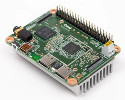Google preps low-cost Coral Dev Board Mini and Edge TPU LGA module
Jan 3, 2020 — by Eric Brown 2,781 views Google unveiled a smaller, cheaper “Coral Dev Board Mini” sibling to its Coral Dev Board that similarly features its Edge TPU and runs Linux — this time on a quad -A35 MediaTek 8167s. There’s also a solderable Edge TPU module and a new, up to 4GB Coral SOM model.
Google unveiled a smaller, cheaper “Coral Dev Board Mini” sibling to its Coral Dev Board that similarly features its Edge TPU and runs Linux — this time on a quad -A35 MediaTek 8167s. There’s also a solderable Edge TPU module and a new, up to 4GB Coral SOM model.
Google started off the new decade with news about some upcoming Coral products incorporating its Edge TPU AI chip. Leading the charge is the Linux-driven, open-spec Coral Dev Board Mini, a lower-cost alternative to the Coral Dev Board. There’s also a solderable Coral Accelerator Module that incorporates the same Edge TPU chip found in the other Coral products and a new version of the Coral SOM compute module with more RAM.

Coral Accelerator Module
(click image to enlarge)
The Edge TPU is a stripped-down version of Google’s TPU Unit designed to run TensorFlow Lite ML models for high-speed ML inferencing on low-powered Arm Linux systems. The Edge TPU runs at 4-TOPS using 0.5 watts for each TOPS (2 TOPS per watt), says Google.
Coral Dev Board Mini
— ADVERTISEMENT —
Unlike the sandwich-style, $150 Coral Dev Board, the Coral Dev Board Mini does not use the NXP i.MX8M and Edge TPU equipped Coral SOM, but instead directly incorporates a less powerful MediaTek 8167s SoC. The Edge TPU is integrated separately — Google does not mention whether it uses the new Coral Accelerator Module. Like the Coral Dev Board, the Mini version runs Mendel, Google’s version of Debian Linux.


Coral Dev Board Mini (left) and earlier Coral Dev Board
(click images to enlarge)
The power-efficient MediaTek 8167 is equipped with 4x up to 1.3GHz Cortex-A35 cores and an Imagination PowerVR GE8300 GPU. The SoC “excels at 720P video encoding/decoding and computer vision use cases,” says Google. Compared to its higher-resolution siblings, the MediaTek 8167a and 8167b, the SoC adds extensive audio interfaces including I2S and 8-channel TDM input and output. The SoC can “process algorithms for multiple high-resolution audio streams at the same time,” says MediaTek.
Google has yet to post full specs for the Coral Dev Board Mini, which will ship with 2GB DDR3L and 8GB eMMC. The size has decreased in part by dispensing with the GbE and USB 3.0 host ports. It also appears that the microSD slot has disappeared. The dual USB 2.0 Type-C ports remain, and the HDMI 2.0a port has shrunk to a micro-HDMI 1.4.
Like the larger board, the Mini provides 802.11ac with Bluetooth (now 5.0), and offers 4-lane MIPI-DSI and -CSI connectors. It also similarly provides a 40-pin GPIO connector and a 3.5mm audio jack. There’s only one digital PDM microphone instead of two and a 2-pin rather than a 4-pin stereo speaker connector.
Coral Accelerator Module and updated Coral SOM
Unlike earlier Edge TPU add-ons such as the Coral USB Accelerator and PCI-E Accelerator, the Coral Accelerator Module is solderable and designed for easy integration into custom PCB design. Built by Murata, the multi-chip LGA package integrates the Edge TPU.
The Coral Accelerator Module exposes PCIe 2.0 and USB 2.0 interfaces and offers an optional I2C control interface. Like the Coral Dev Board Mini, the 15 x 10mm module will be available in 1H 2020.

Current 1GB Coral SOM module
(click image to enlarge)
The 48 x 40mm Coral SOM will soon be available in 2GB and 4GB LPDDR4 models in addition to the current 1GB model. All three models combine the Edge TPU with a 1.5GHz, quad -A53 i.MX8M with a Cortex-M4F core and Vivante GC7000 Lite Graphics.
Other Coral SOM features include 8GB eMMC and dual-band, 2×2 MIMO 802.11b/g/n/ac with Bluetooth 4.1. No pricing was listed but the current 1GB model sells for $115 in single units.
Google also said that Asus’ Coral SOM-based Tinker Edge T will be available soon. More information may be found at the company’s Tinker Edge T page.
Further information
More information on the Coral Dev Board Mini, Coral Accelerator Module, and 2GB and 4GB Coral SOM models may be found in Google’s announcement, which has links to preliminary product pages.
The Coral Dev Board Mini and Coral Accelerator Module will be available in the first half of 2020, with undisclosed pricing. The Mini board will be on display during CES 2020, Jan 7-10 at the MediaTek showcase in the Venetian, Tech West, Level 3 in Las Vegas. More information on the Coral Accelerator Module may be found at the Murata exhibit at CES at LVCC, South Hall 2, MP26061.
The new Coral SOM models will be available “soon.” More information may be on tap at CES at the NXP pavilion at the Las Vegas Convention Center, Tech East, Central Plaza, CP-18.

Please comment here...